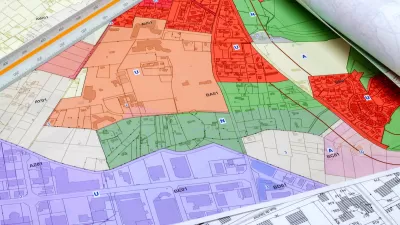As mixed-use development increasingly supersedes single-use development, Roger K. Lewis argues that we should retire the word "zoning" and its outdated "characterization of how we plan and shape growth."
Although we still need land-use regulation, says Lewis, "zoning increasingly has become a conceptually inappropriate term." In an era in which elements typically regulated by zoning such as parking requirements, height limits, and maximum densities are becoming flexible and negotiable, Lewis argues that the term, and its conventions, have become obsolete.
"Principles and methods of land use planning, transportation, regulation and real estate development are changing, as are demographics and social norms," he writes. "Zoning conventions are no longer conventional. Throughout metropolitan Washington, zoning transformations are evident in dozens of new development or redevelopment projects."
"Planning and zoning predicated on accommodating cars are now giving way to transit-oriented development patterns. Uses and densities are now being tweaked in areas served by rail, subway, streetcar and bus rapid-transit lines. Street and block networks are being configured, or reconfigured, to accommodate pedestrians and bikers, as well as cars and commercial vehicles."
"Dropping the word 'zoning' necessitates using an alternative vocabulary. It’s time to talk less about zoning restrictions and limits and more about visionary plans, urban design goals and architectural aspirations."
FULL STORY: As land use planning changes, ‘zoning’ is no longer appropriate

Maui's Vacation Rental Debate Turns Ugly
Verbal attacks, misinformation campaigns and fistfights plague a high-stakes debate to convert thousands of vacation rentals into long-term housing.

Planetizen Federal Action Tracker
A weekly monitor of how Trump’s orders and actions are impacting planners and planning in America.

In Urban Planning, AI Prompting Could be the New Design Thinking
Creativity has long been key to great urban design. What if we see AI as our new creative partner?

How Trump's HUD Budget Proposal Would Harm Homelessness Response
Experts say the change to the HUD budget would make it more difficult to identify people who are homeless and connect them with services, and to prevent homelessness.

The Vast Potential of the Right-of-Way
One writer argues that the space between two building faces is the most important element of the built environment.

Florida Seniors Face Rising Homelessness Risk
High housing costs are pushing more seniors, many of them on a fixed income, into homelessness.
Urban Design for Planners 1: Software Tools
This six-course series explores essential urban design concepts using open source software and equips planners with the tools they need to participate fully in the urban design process.
Planning for Universal Design
Learn the tools for implementing Universal Design in planning regulations.
Gallatin County Department of Planning & Community Development
Heyer Gruel & Associates PA
JM Goldson LLC
City of Camden Redevelopment Agency
City of Astoria
Transportation Research & Education Center (TREC) at Portland State University
Jefferson Parish Government
Camden Redevelopment Agency
City of Claremont





























